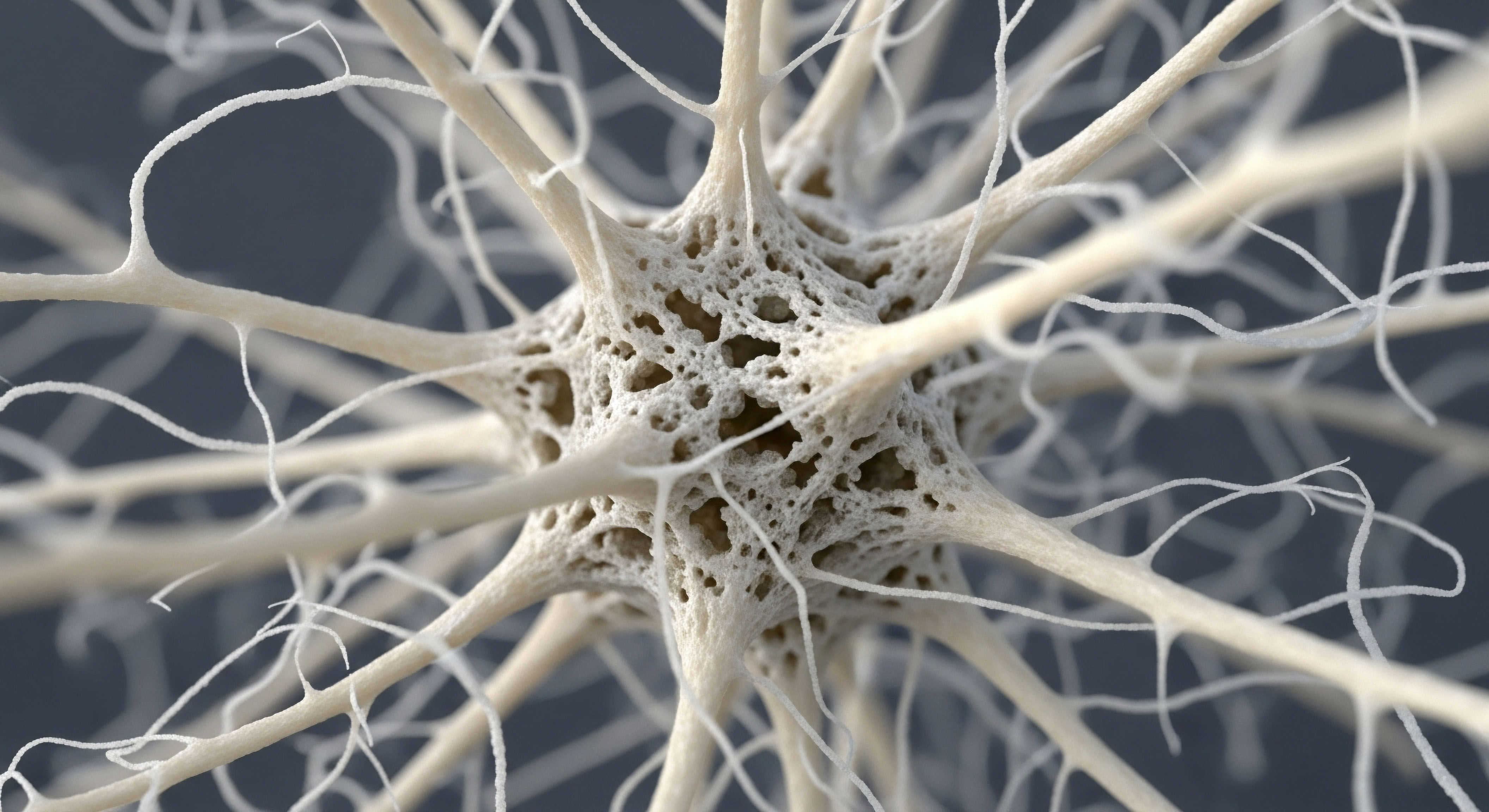

Fundamentals
Have you ever experienced those moments when your thoughts feel less sharp, your memory seems to falter, or your mental energy wanes? This sensation of a mind not operating at its peak can be disorienting, often leaving individuals feeling disconnected from their vibrant selves.
It is a common experience, yet one that often prompts a quiet concern about what might be shifting within our biological systems. Understanding these subtle changes, and how they relate to the intricate network of the body’s internal messaging, marks the initial step toward reclaiming mental clarity and overall vitality.
Our biological systems function through a complex orchestra of chemical messengers. Among these, hormones, neurotransmitters, and peptides serve as the body’s primary communication network, each playing a distinct yet interconnected role in regulating everything from mood and energy levels to the sharpness of our cognitive abilities. When this delicate balance is disrupted, the impact can be felt across various physiological domains, including the brain’s capacity for optimal function.
The pursuit of enhanced mental performance has a long history, leading to the development of various interventions. Traditionally, this realm has seen the use of compounds known as cognitive enhancers, often targeting specific neurotransmitter pathways to improve alertness or focus. These substances typically aim to modulate existing neural circuits, often by influencing the reuptake or availability of key signaling molecules within the brain.
A distinct category of compounds, peptides, presents an alternative avenue for supporting cognitive health. These short chains of amino acids operate with a different kind of biological precision. Rather than broadly stimulating neurotransmitter systems, peptides often act as signaling molecules themselves, interacting with specific receptors to influence cellular processes, modulate gene expression, or promote tissue repair. Their actions can be more targeted, influencing fundamental aspects of neural health, such as synaptic plasticity and neuroprotection.
Understanding the body’s internal communication systems, including hormones, neurotransmitters, and peptides, is essential for addressing cognitive shifts and pursuing enhanced mental performance.
The distinction between these two categories of agents lies not only in their chemical structure but also in their fundamental approach to influencing brain function. Traditional enhancers frequently provide a more immediate, often stimulant-like effect, designed to boost performance in the short term.
Peptides, conversely, often work by supporting the underlying biological infrastructure of the brain, aiming for more sustained and foundational improvements in neural resilience and function. This difference in operational philosophy shapes their respective roles in personalized wellness protocols.

The Brain’s Internal Wiring How Does It Influence Cognition?
The brain, a remarkable organ, relies on intricate electrical and chemical signals for all its operations. Neurons, the fundamental units of the nervous system, communicate across tiny gaps called synapses. Neurotransmitters, released from one neuron, bind to receptors on another, transmitting information. This constant flow of information underpins every thought, memory, and action. The efficiency and adaptability of these synaptic connections, a concept known as synaptic plasticity, are paramount for learning and memory formation.
Beyond the immediate neural circuits, the brain’s function is profoundly influenced by systemic factors, particularly the endocrine system. Hormones, secreted by glands throughout the body, travel through the bloodstream to exert their effects on distant target cells, including those within the brain.
This neuroendocrine interplay means that fluctuations in hormonal balance can directly impact cognitive processes, affecting everything from mood regulation to the ability to concentrate and recall information. Recognizing this systemic interconnectedness is vital for a comprehensive understanding of cognitive well-being.

Hormonal Messengers and Brain Function
Hormones act as master regulators, orchestrating a wide array of physiological processes. For instance, testosterone, often associated with male physiology, also plays a significant role in brain health for both men and women. Its influence extends to mood, spatial cognition, and verbal memory.
Similarly, estrogen in women is deeply involved in neural protection, synaptic density, and cognitive functions, particularly memory. Disruptions in these hormonal levels, whether due to aging, stress, or other factors, can manifest as cognitive complaints, such as mental fogginess or reduced processing speed.
Another critical hormonal system involves growth hormone (GH) and its downstream mediator, insulin-like growth factor-1 (IGF-1). This axis is known to influence brain development, neuroprotection, and cognitive function. Declining levels of GH, often associated with aging, have been linked to impaired cognitive performance. Supporting this system, therefore, holds potential for maintaining mental acuity. The body’s ability to maintain optimal levels of these hormonal messengers is a cornerstone of sustained cognitive vitality.


Intermediate
When considering interventions for cognitive support, the landscape broadens beyond general lifestyle adjustments to include specific pharmacological and biological agents. Traditional cognitive enhancers and peptides represent two distinct categories, each with unique mechanisms and applications. Understanding their operational differences is key to discerning their respective roles in a personalized wellness strategy.

Traditional Cognitive Enhancers How Do They Operate?
Traditional cognitive enhancers, often referred to as “smart drugs,” typically work by modulating the activity of neurotransmitters within the brain. These substances are designed to produce a more immediate effect, often by increasing the availability of specific chemical messengers at the synaptic cleft.
- Methylphenidate ∞ This compound, commonly known by brand names like Ritalin, functions as a central nervous system stimulant. It primarily inhibits the reuptake of dopamine and noradrenaline in the brain, leading to increased extracellular levels of these neurotransmitters. Elevated dopamine can enhance focus, attention, and motivation, while increased noradrenaline contributes to alertness. Its action is similar to that of cocaine, carrying a risk of euphoria and dependence.
- Modafinil ∞ Marketed for conditions like narcolepsy, Modafinil promotes wakefulness. Its precise mechanism of action remains under investigation, but it is believed to influence several neurotransmitter systems, including histamine, gamma-aminobutyric acid (GABA), glutamate, and hypocretin. While it can improve alertness and concentration in sleep-deprived individuals, its benefits over caffeine for healthy, well-rested adults are not consistently demonstrated.
- Donepezil ∞ Approved for the management of Alzheimer’s dementia, Donepezil operates by inhibiting acetylcholinesterase, an enzyme that breaks down acetylcholine. By preserving acetylcholine levels, it aims to improve mental faculties such as attention, memory, and social interaction, which are often compromised in conditions characterized by cholinergic system downregulation.
These agents primarily aim to optimize existing neural pathways, often providing a symptomatic improvement in cognitive performance. Their effects can be potent, but they also carry considerations regarding side effects, potential for dependence, and the need for careful medical supervision.
Traditional cognitive enhancers typically modulate neurotransmitter activity for immediate effects, while peptides often influence cellular processes for foundational improvements.

Peptide Therapy a Different Biological Approach
Peptides, as smaller protein fragments, interact with the body’s systems in a more nuanced manner. Their actions are often receptor-specific, influencing cellular signaling pathways, gene expression, and tissue regeneration. This allows for a broader, more systemic impact on overall well-being, which can indirectly or directly support cognitive function.

Growth Hormone Peptide Therapy
A significant area of peptide application involves stimulating the body’s natural production of growth hormone. This approach avoids direct administration of synthetic GH, instead utilizing peptides that signal the pituitary gland to release its own stores.
- Sermorelin ∞ This peptide is a growth hormone-releasing hormone (GHRH) analog. It stimulates the pituitary gland to secrete GH in a pulsatile, physiological manner, mimicking the body’s natural rhythm. Increased GH levels can support neuroprotection, enhance neurogenesis, and potentially improve cognitive functions like memory and mental processing speed, particularly in individuals with age-related GH decline.
- Ipamorelin / CJC-1295 ∞ Ipamorelin is a growth hormone secretagogue, selectively stimulating GH release without significantly impacting other hormones like cortisol or prolactin. CJC-1295 is a GHRH analog that has a longer half-life, providing a sustained release of GH. When combined, these peptides offer a robust stimulation of endogenous GH, supporting muscle gain, fat loss, sleep quality, and potentially cognitive vitality through improved cellular repair and metabolic function.
- Tesamorelin ∞ This GHRH analog is specifically known for its effects on reducing visceral fat, but its influence on the GH-IGF-1 axis also suggests potential systemic benefits that could indirectly support brain health.
- Hexarelin ∞ Similar to Ipamorelin, Hexarelin is a GH secretagogue. Research indicates it may possess neuroprotective properties, which could contribute to overall brain resilience.
- MK-677 (Ibutamoren) ∞ While not a peptide, MK-677 is a non-peptide growth hormone secretagogue that orally stimulates GH release. Its actions are similar to those of GH-releasing peptides, promoting increased GH and IGF-1 levels, which can support tissue repair, sleep, and potentially cognitive aspects related to metabolic health.

Other Targeted Peptides
Beyond GH-stimulating peptides, other compounds are designed for specific physiological effects, some of which can influence aspects of cognitive or overall systemic health.
- PT-141 (Bremelanotide) ∞ This peptide acts on melanocortin receptors in the central nervous system, primarily known for its role in sexual health by influencing desire and arousal. Its central action highlights the interconnectedness of neurological pathways and physiological responses.
- Pentadeca Arginate (PDA) ∞ PDA is recognized for its role in tissue repair, wound healing, and modulating inflammatory responses. While not directly a cognitive enhancer, systemic inflammation can negatively impact brain function. By addressing inflammation and supporting cellular repair, PDA could indirectly contribute to a healthier neural environment.
The mechanisms of peptides often involve supporting the body’s inherent regenerative and regulatory capacities, offering a more foundational approach to health optimization.

Comparing Approaches
The choice between traditional cognitive enhancers and peptides depends on individual goals, underlying health status, and a thorough understanding of their respective actions.
| Characteristic | Traditional Cognitive Enhancers | Peptides (e.g. GH-Releasing Peptides) |
|---|---|---|
| Primary Mechanism | Modulate neurotransmitter levels (e.g. dopamine, acetylcholine) | Stimulate endogenous hormone release, influence cellular signaling, promote tissue repair |
| Effect Profile | Often immediate, stimulant-like, focus/alertness boost | More systemic, foundational, gradual improvements in vitality, sleep, body composition, neuroprotection |
| Targeted Systems | Specific neural circuits, neurotransmitter reuptake | Endocrine axes (e.g. somatotropic axis), cellular regeneration, anti-inflammatory pathways |
| Typical Application | Symptomatic relief for attention deficits, wakefulness promotion | Longevity, anti-aging, muscle gain, fat loss, sleep optimization, general well-being, neuroprotection |
| Considerations | Potential for dependence, side effects (cardiovascular, anxiety), narrow therapeutic window | Generally well-tolerated, focus on physiological restoration, requires injection for many |
For individuals seeking a broad recalibration of their biological systems, peptides that support hormonal balance, such as those stimulating growth hormone, offer a compelling avenue. This contrasts with the more focused, often symptomatic, approach of traditional cognitive enhancers.

Hormonal Optimization Protocols and Cognitive Well-Being
The impact of hormonal balance on cognitive function cannot be overstated. Personalized wellness protocols often address hormonal deficiencies as a core strategy for improving overall vitality, which inherently includes mental acuity.

Testosterone Replacement Therapy (TRT) for Men
For men experiencing symptoms of low testosterone, such as reduced mental clarity, fatigue, and diminished libido, TRT can be a transformative intervention. A standard protocol often involves weekly intramuscular injections of Testosterone Cypionate. To maintain natural testosterone production and fertility, Gonadorelin is frequently included, administered via subcutaneous injections.
Additionally, Anastrozole, an aromatase inhibitor, may be prescribed to manage estrogen conversion and mitigate potential side effects. Some studies suggest that testosterone supplementation may have moderate positive effects on specific cognitive domains, such as spatial ability, executive function, and psychomotor speed in older men with low testosterone.
However, other research, including the Testosterone Trials, found no significant improvement in various cognitive measures and noted an increase in coronary artery plaque volume with testosterone treatment, underscoring the need for careful consideration and monitoring.

Testosterone Replacement Therapy for Women
Women, too, can experience symptoms related to suboptimal testosterone levels, particularly during peri-menopause and post-menopause, including irregular cycles, mood changes, hot flashes, and low libido. Protocols for women typically involve lower doses of Testosterone Cypionate, often administered weekly via subcutaneous injection. Progesterone is prescribed based on menopausal status to ensure hormonal balance.
In some cases, long-acting pellet therapy for testosterone may be considered, with Anastrozole used when appropriate to manage estrogen levels. Addressing these hormonal imbalances can contribute to improved mood, energy, and overall cognitive stability.
The objective of these hormonal optimization protocols extends beyond symptom management; it aims to restore a physiological state that supports the body’s inherent capacity for health and resilience, including optimal brain function.


Academic
A deep understanding of cognitive enhancement requires moving beyond superficial comparisons to examine the intricate biological systems at play. The brain’s capacity for thought, memory, and executive function is not an isolated phenomenon; it is inextricably linked to the broader neuroendocrine network, where hormones, peptides, and neurotransmitters engage in a continuous, dynamic interplay. This systems-biology perspective reveals how interventions, particularly peptide therapies, can influence cognition through fundamental biological recalibration.

The Neuroendocrine Axis and Cognitive Regulation
Central to this understanding is the concept of neuroendocrine axes, which are complex feedback loops regulating hormone production and release. The Hypothalamic-Pituitary-Gonadal (HPG) axis and the Growth Hormone-Insulin-like Growth Factor 1 (GH-IGF-1) axis are particularly relevant to cognitive health.
- HPG Axis and Cognition ∞ The HPG axis regulates the production of sex hormones, including testosterone and estrogen. These steroids are not merely reproductive hormones; they exert significant effects on neuronal structure, synaptic plasticity, and neurotransmitter systems within the brain. For instance, estrogen has neuroprotective properties and influences memory consolidation, while testosterone impacts spatial cognition and executive function. Dysregulation of this axis, common with aging or stress, can lead to cognitive decline. Interventions like Testosterone Replacement Therapy (TRT) aim to restore optimal levels, with studies showing mixed but often positive effects on specific cognitive domains in hypogonadal individuals. However, the TTrials highlighted the need for caution, noting no overall cognitive improvement and an increase in coronary artery plaque volume in older men. This complexity underscores that hormonal optimization is a precise endeavor, requiring careful monitoring.
- GH-IGF-1 Axis and Neuroprotection ∞ The GH-IGF-1 axis is crucial for brain development and adult neuroplasticity. Growth hormone, secreted by the pituitary, stimulates the production of IGF-1, a potent neurotrophic factor, in various tissues, including the brain. IGF-1 promotes neuronal survival, synaptic formation, and myelination. Age-related decline in GH and IGF-1 is associated with impaired cognitive function. Peptides like Sermorelin and Ipamorelin, by stimulating endogenous GH release, aim to restore this axis’s activity, thereby supporting neurogenesis and neuroprotection. Research indicates that GH and GH-releasing peptides can increase brain IGF-I expression and activate intracellular signaling pathways involved in neuroprotection, leading to improvements in memory and mental processing speed, particularly after brain injury or in GH-deficient states.
The interconnectedness of these axes means that a disruption in one can cascade effects throughout the entire system, impacting cognitive resilience.
Cognitive function is deeply intertwined with neuroendocrine axes, where hormones and peptides dynamically influence brain health and plasticity.

Molecular Mechanisms of Peptide Action on Neural Function
Peptides exert their influence at a molecular level, often by interacting with specific receptors to initiate intracellular signaling cascades. This targeted action distinguishes them from many traditional cognitive enhancers that operate through broader neurotransmitter modulation.
Consider specific cognitive-enhancing peptides identified in research:
- FGL (Fibroblast Growth Factor Loop mimetic) ∞ Derived from the neural cell adhesion molecule (NCAM), FGL enhances cognition by activating the Protein Kinase C (PKC) pathway. This activation triggers an activity-dependent delivery of AMPA receptors to synapses, thereby strengthening synaptic connections and improving learning and memory. This mechanism directly supports synaptic plasticity, a fundamental process for cognitive function.
- PTD4-PI3KAc peptide ∞ This peptide promotes synapse and spine formation by activating the PI3K signaling pathway, leading to enhanced hippocampal-dependent memory. Synapse formation is critical for the brain’s ability to store and retrieve information.
- PTEN-derived peptides ∞ A new class of peptides derived from the tumor suppressor PTEN shows promise in preventing pathological interactions between PTEN and PDZ proteins at synapses during exposure to Amyloid beta. This action can prevent memory deterioration in models of Alzheimer’s disease, highlighting a neuroprotective role against specific pathological processes.
These examples illustrate how peptides can directly influence the structural and functional integrity of neurons, promoting neuroplasticity and protecting against neurodegeneration. Their actions are often more foundational, aiming to restore or optimize the underlying biological machinery of the brain.

Metabolic Interplay and Cognitive Health
Cognitive function is also profoundly influenced by metabolic health. Conditions like insulin resistance, often linked to hormonal imbalances, can negatively impact brain energy metabolism and neuronal function.
| Hormonal/Peptide System | Metabolic Link | Cognitive Impact |
|---|---|---|
| Testosterone | Influences insulin sensitivity, body composition | Mixed evidence; some studies show improvements in spatial cognition, executive function; others show no benefit or cardiovascular concerns. |
| Growth Hormone / IGF-1 | Regulates glucose homeostasis, lipolysis, protein synthesis | Supports neurogenesis, neuroprotection, improved memory, mental processing speed, especially in deficiency or after injury. |
| Bioactive Peptides (General) | Anti-inflammatory, antioxidative properties | Indirectly supports brain health by reducing systemic inflammation and oxidative stress, which can impair cognitive function. |
The systemic effects of peptides, particularly those that modulate the GH-IGF-1 axis, extend to metabolic regulation. Improved insulin sensitivity and optimized energy metabolism can provide a more stable and efficient environment for neuronal activity, thereby supporting cognitive performance. This holistic perspective, recognizing the interconnectedness of endocrine, neural, and metabolic systems, guides a more comprehensive approach to cognitive well-being.
The scientific literature continues to expand our understanding of these complex interactions. While traditional cognitive enhancers offer targeted symptomatic relief, peptides present a compelling avenue for addressing cognitive health through a broader, more foundational biological recalibration. This distinction is paramount for individuals seeking not just temporary boosts, but sustained vitality and optimal function.

References
- Narahashi, T. Moriguchi, S. Zhao, X. Marszalec, W. & Yeh, J. Z. (2004). Mechanisms of action of cognitive enhancers on neuroreceptors. Biological & Pharmaceutical Bulletin, 27(11), 1701-1706.
- Ben-Shabat, M. & Gincberg, E. (2018). Peptides Acting as Cognitive Enhancers. Neuroscience, 370, 81-87.
- Tan, S. Sohrabi, H. R. Weinborn, M. Tegg, M. Bucks, R. S. Taddei, K. & Martins, R. N. (2019). Effects of testosterone supplementation on separate cognitive domains in cognitively healthy older men ∞ a meta-analysis of current randomized clinical trials. The Journal of Clinical Endocrinology & Metabolism, 104(11), 5424-5437.
- Kim, J. H. & Kim, H. S. (2022). Impact of Peptide Transport and Memory Function in the Brain. Molecules, 27(18), 5897.
- Hussain, S. & Ahmad, S. (2021). Pharmacological cognitive enhancement ∞ a promising or an inevitable future?. Revista Bioética, 29(1), 87-99.
- Scheepens, A. van der Beek, E. M. & van der Lely, A. J. (2001). Growth Hormone (GH) and GH-Releasing Peptide-6 Increase Brain Insulin-Like Growth Factor-I Expression and Activate Intracellular Signaling Pathways Involved in Neuroprotection. Endocrinology, 142(11), 4725-4733.
- Moloney, B. M. & Scheepens, A. (2023). The multiple roles of GH in neural ageing and injury. Frontiers in Endocrinology, 14, 1140993.
- Devesa, J. Devesa, P. & Reimunde, P. (2018). New findings on brain actions of growth hormone and potential clinical implications. International Journal of Molecular Sciences, 19(12), 3874.
- Arumugam, T. V. & Scheepens, A. (2018). Growth Hormone Improves Cognitive Function After Experimental Stroke. Stroke, 49(5), 1269-1277.
- Beauchet, O. (2006). Testosterone and cognitive function ∞ current clinical evidence of a relationship. European Journal of Endocrinology, 155(6), 773-781.
- Resnick, S. M. et al. (2017). Testosterone Treatment and Cognitive Function in Older Men With Low Testosterone and Age-Associated Memory Impairment. JAMA, 317(7), 717-727.
- Narahashi, T. Moriguchi, S. Zhao, X. Marszalec, W. & Yeh, J. Z. (2004). Mechanisms of action of cognitive enhancers on neuroreceptors. Biological & Pharmaceutical Bulletin, 27(11), 1701-1706.
- Tan, S. Sohrabi, H. R. Weinborn, M. Tegg, M. Bucks, R. S. Taddei, K. & Martins, R. N. (2019). Effects of testosterone supplementation on separate cognitive domains in cognitively healthy older men ∞ a meta-analysis of current randomized clinical trials. The Journal of Clinical Endocrinology & Metabolism, 104(11), 5424-5437.
- Shin, Y. S. et al. (2016). Effect of Testosterone Replacement Therapy on Cognitive Performance and Depression in Men with Testosterone Deficiency Syndrome. The World Journal of Men’s Health, 34(3), 177-184.

Reflection
The journey toward understanding your own biological systems is a deeply personal one, often beginning with a recognition of subtle shifts in how you feel and function. The insights shared here, particularly regarding the distinctions between traditional cognitive enhancers and the broader, systemic influence of peptides, are not merely academic points. They represent a framework for introspection, inviting you to consider the intricate connections within your own body.
This exploration of hormonal health, metabolic function, and the precise actions of various agents is a step toward recognizing that vitality is not a fixed state, but a dynamic equilibrium. Reclaiming optimal function often involves a thoughtful, evidence-based approach to supporting your body’s inherent intelligence. This knowledge serves as a compass, guiding you toward a path where informed choices lead to a more vibrant and fully expressed life.



